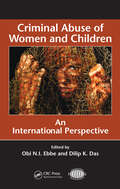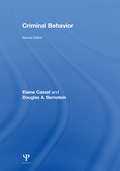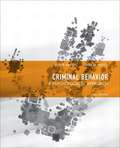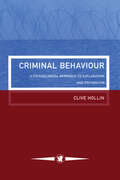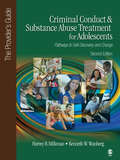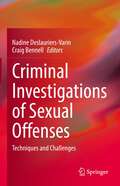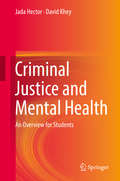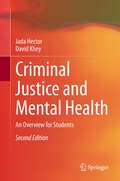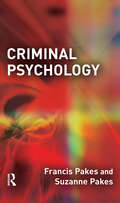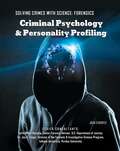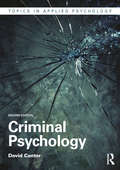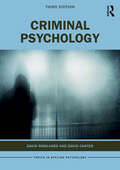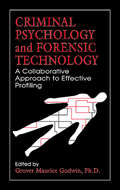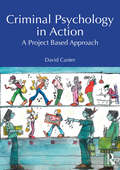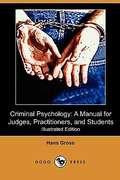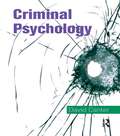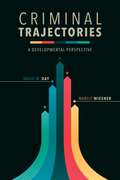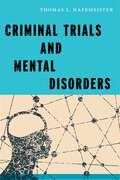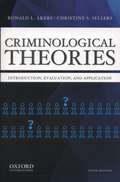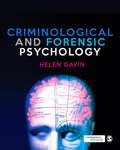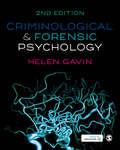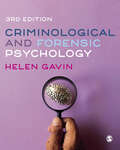- Table View
- List View
Criminal Abuse of Women and Children: An International Perspective (International Police Executive Symposium Co-Publications)
by Dilip K. Das Obi N.I. EbbeThe abuse of women and children transcends geographical boundaries as well as economic, cultural, religious, political, and social divisions. Comprised of the work of more than 20 academics and practitioners from around the world, Criminal Abuse of Women and Children documents the atrocities that have been committed against these victims from ancie
Criminal Behavior
by Douglas A. Bernstein Elaine CasselCriminal Behavior explores crime as a developmental process from birth through early adulthood. It further examines the role that legal, political, and criminal justice systems play in the development of criminal behavior. Criminal Behavior:takes into account biological, genetic, developmental, familial, social, educational, cultural, political, an
Criminal Behavior: A Psychological Approach (Tenth Edition)
by Curt R. Bartol Anne M. BartolA comprehensive psychological approach to criminal behavior. Accurate, researched-based, contemporary, and comprehensive: Criminal Behavior: A Psychological Approach, Tenth Edition, builds on the excellence established in previous editions. The text offers a detailed look at crime, what may lead to it, and how criminal behavior may be prevented, all from a psychological perspective. Focusing on serious crimes, particularly those involving violence, Criminal Behavior offers a comprehensive look at this complex field with effective and engaging material that has been classroom-tested for over thirty years.
Criminal Behaviour: A Psychological Approach To Explanation And Prevention (Contemporary Psychology Ser. #Vol. 8)
by Clive HollinThis study looks at contemporary psychological research and theory into criminal behaviour and considers the relationship between psychological and criminological theories. At the same time, the book examines the impact of psychology on strategies.
Criminal Conduct and Substance Abuse Treatment for Adolescents: The Provider's Guide
by Dr Harvey B. Milkman Dr Kenneth W. WanbergThis Provider's Guide introduces a comprehensive and developmentally appropriate treatment program,, Pathways for Self-Discovery and Change (PSDC), which provides the specific tools necessary for improving evaluation and treatment of at-risk youth, a particularly vulnerable patient population in the justice system. Using an adolescent-focused format, this protocol identifies psychological, biological, and social factors that contribute to the onset of adolescent deviance, and establishes guidelines for delivery of a 32-session treatment curriculum designed to rehabilitate both male and female adolescents with co-occurring substance abuse and criminal conduct.Now in its Second Edition, this guide provides treatment practitioners, program evaluators, and youth services administrators with the most up to date, comprehensive, and accessible information for the treatment and rehabilitation of juvenile justice clients. It is built on theoretical and research advances in the treatment and rehabilitation of juvenile justice clients, as well as feedback over the past seven years from PSDC counselees, treatment providers, and program administrators.
Criminal Investigations of Sexual Offenses: Techniques and Challenges
by Craig Bennell Nadine Deslauriers-VarinIt is startling to read how few sexual offenses are reported in a year; even more shocking to see how few reports lead to an arrest. Research on effective responses to sexual offenses is much needed and ongoing. This edited book presents the current state of research on investigative techniques used in sex crime investigations, and the operational challenges and issues that arise in these investigations. Including an international cohort of scholars from various academic backgrounds, it reviews current efforts in key areas, synthesizing the research to make recommendations for the improvement of investigative practices and the criminal justice system’s response to sexual offenses.Each chapter includes a brief introduction to the topic, a review of the research, and a discussion of the key points relevant to investigators and researchers as they move forward. The book is broken down into four themes: suspect prioritization and identification techniques, investigative interviewing, operational challenges and issues, and the investigation of specific types of sex crimes.With its broad coverage and international scope, this volume fills the gap in knowledge for investigators working on sex crimes cases. With its easy-to-read style and clear analysis of the research, this is the perfect volume for investigators and law enforcement officers, policy makers and researchers, and students in criminology and criminal justice, forensic psychology, and victim services.
Criminal Justice and Mental Health: An Overview For Students
by Jada Hector David KheyThis textbook provides an overview for students in Criminology and Criminal Justice about the overlap between the criminal justice system and mental health. It provides an accessible overview of basic signs and symptoms of major mental illnesses and size of scope of justice-involved individuals with mental illness.In the United States, the criminal justice system is often the first public service to be in contact with individuals suffering from mental illness or in mental distress. Those with untreated mental illnesses are often at higher risk for committing criminal acts, yet research on this population continues to shed light on common myths – such a prevailing assumption that those with mental illness tend to commit more violent crimes. Law enforcement agents may be called in as first responders for cases of mental distress; and due to a lack of mental health facilities, resources, and pervasive misconceptions about this population, those with mental illness often end up in the corrections system. In this environment, students in Criminology and Criminal Justice are likely to encounter those with mental illness in their future career paths, and need to be prepared for this reality. This timely work covers the roles of each part of the criminal justice system interacting with mentally ill individuals, from law enforcement and first responders, social services, public health services, sentencing and corrections, to release and re-entry. It also covers the crucial topic of mental health for criminal justice professionals, who suffer from high rates of job stress, PTSD, and other mental health issues. The final section of the book includes suggestions for future research. This work will be of interest to students of criminology and criminal justice with an interest in working in the professional sector, as well as those in related fields of sociology, psychology, and public health. It will also be of interest to policy-makers and practitioners already working in the field. The overall goal of this work is to inform, educate, and inspire change.
Criminal Justice and Mental Health: An Overview for Students
by Jada Hector David KheyThis textbook provides an overview of the overlap between the criminal justice system and mental health for students of criminology and criminal justice. It provides an accessible overview of basic signs and symptoms of major mental illnesses and size of scope of justice-involved individuals with mental illness. In the United States, the law enforcement and the criminal justice system is often the first public service to be in contact with individuals suffering from mental illness or in mental distress. Those with untreated mental illnesses are often at higher risk for committing criminal acts, and due to a lack of mental health facilities, resources, and pervasive misconceptions about this population, those with mental illness often end up in the corrections system. This timely work covers the roles of each part of the criminal justice system interacting with mentally ill individuals, from law enforcement and first responders, social services, public health services, sentencing and corrections, to release and re-entry. It also addresses the crucial need of mental healthcare for criminal justice professionals, who suffer from high rates of job stress, PTSD, and other mental health issues. With new chapters on stigma, mental illness during and after disaster and crisis, and updates and new supplementary materials throughout, this book will be of interest to students of criminology and criminal justice, sociology, psychology, and public health. It will also be of interest to policy-makers and practitioners already working in the field, interacting with and addressing the needs of mentally ill individuals.
Criminal Psychology
by Francis Pakes Suzanne PakesThis book provides an accessible introduction to the increasingly popular subject of criminal psychology. It explores the application of psychology to understanding the crime phenomenon, criminal behaviour,solving crimes, the court process and punishment rehabilitation. It will be an invaluable resource for anybody taking courses in this field, in particular students taking the criminal psychology/forensic psychology components of the main A-level psychology specifications. The book is fully in line with the new A-level specifications being taught from September 2009. Each chapter includes case studies, keystudies, evaluations and a range of discussion questions. Apart from providing in depth and up-to-date knowledge on criminal psychology, the book is equally up-to-date on trends and issues in criminal justice today.
Criminal Psychology & Personality Profiling (Solving Crimes With Science: Forensics #12)
by Joan EsherickTelevision programs and feature films present criminal psychology and profiling as a blend of psychic visions, supernatural intuition, and evidence analysis. The reality, however, is quite different. Using true-crime case studies from history and the present, examples from current and former FBI profilers, and informative sidebars, Criminal Psychology & Personality Profiling explores the many roles and responsibilities criminal psychologists and profilers fill as they support other professionals in addressing crime and its consequences. From crime-scene analysis to offering expert testimony in court, these behavioral scientists offer an understanding of crime, the criminal mind, and those affected by crime.
Criminal Psychology (Topics in Applied Psychology)
by David CanterThis thoroughly updated and revised new edition provides an essential overview of a full range of psychological contributions to the understanding of crime and the processes of dealing with offenders and helping their victims. From the cognitive, developmental and social processes that influence a diverse range of crimes, including burglary, fraud, rape and murder, to the challenges faced by the police and courts in investigating crime or securing reliable testimony, the text is packed with pedagogical features that bring this fascinating subject to life. These include boxes highlighting key topics or issues around research methods, further reading and suggested essay titles. Also including chapters on rehabilitation in prisons and the psychology of victims, the text examines hot topics such as gang membership and terrorism, as well as discussing how psychology may better understand criminals and criminal behaviour in the future. It builds to a comprehensive and accessible introduction to the field. It will be ideal for students across psychology, criminology and socio-legal studies and law.
Criminal Psychology (Topics in Applied Psychology)
by David Canter David RowlandsThis carefully revised third edition of Criminal Psychology offers a vital, up-to-date account of the wide range of psychological contributions to the understanding of criminals and crime, its investigation, the legal processes of dealing with offenders, and helping victims.The book provides insights into cognitive, developmental, and social theories of a diverse range of crimes, including domestic abuse, burglary, fraud, rape, murder, and terrorism. It also discusses the psychological contributions to policing, criminal investigations, and court processes, and gives consideration to securing reliable testimony and rehabilitation in prisons. The third edition complements the topics established in earlier editions with the addition of current and emerging issues in the study of criminal psychology, including cybercrime, new forms of fraud, and developments in organised crime, as well as the future of crimes and their psychology. The well-illustrated text is packed with pedagogical features that bring this fascinating subject to life, including boxes highlighting key topics, descriptions of research methods, further reading, and suggested essay titles.Offering a comprehensive, accessible, contemporary introduction, the book shows that many aspects of psychology are essential for understanding criminals and their actions, the investigation of crime, and court procedures. This is the ideal text for students across psychology, criminology, socio-legal studies, and law, as well as everyone who wishes to gain an overview of criminal psychology.
Criminal Psychology and Forensic Technology: A Collaborative Approach to Effective Profiling
by Grover Maurice GodwinOffender profiling has been developing slowly as a possible investigative tool since 1841 and the publication of Edgar Allen Poe's The Murder in the Rue Morgue. In this book, detective C. Auguste Dupin demonstrates the ability to follow the thought patterns of a companion while they stroll through Paris for 15 minutes without speaking a word. Today
Criminal Psychology in Action: A Project Based Approach
by David CanterCriminal Psychology in Action provides a practical, hands-on introduction to criminal psychology through unique projects for students, illustrating the many ways research into crimes and criminals can be conducted. It also provides an overview of many individual and social psychological theories of criminality.Drawing on over half a century of experience supervising hundreds of projects at undergraduate, master’s, and doctoral levels, David Canter provides well-grounded and detailed guidance for students of how to conduct a range of relevant and interesting projects designed to engage students directly with empirical research. This includes consideration of the ethical and practical issues of doing research in this area, as well as examples of documents needed for informed consent and submissions to ethical committees. The range of research designs described – laboratory experiments, surveys, case studies and simulations – provide introductions to methodologies relevant to many other areas of research beyond criminal psychology.Both engaging and interactive, this is an invaluable resource for instructors and students from colleges and universities around the world in many different fields, such as psychology, criminology, and socio-legal studies. It will also be of interest to all those who want to know more about the psychology of crime and criminality.
Criminal Psychology: A Manual for Judges, Practitioners, and Students
by Hans GrossCriminal Psychology is a book written by Hans Gross. It is widely considered to be one of the top 100 greatest books of all time. This great novel will surely attract a whole new generation of readers.Criminal Psychology is required reading for various courses and curriculums.
Criminal Psychology: A Textbook And Practical Reference Guide For Students And Working Professionals In The Fields Of Law Enforcement, Criminal Justice, Mental Health, and Forensic Psycology
by Laurence MillerA Textbook and Practical Reference Guide for Students and Working Professionals in the Fields of Law Enforcement, Criminal Justice, Mental Health, and Forensic Psychology.
Criminal Psychology: Topics in Applied Psychology
by David CanterTopics in Applied Psychology offers a range of accessible, integrated texts ideal for courses in applied psychology. The books are written by leading figures in their field and provide a comprehensive academic and professional insight into each topic. They incorporate a range of features to bring psychology to life including case histories, research methods, ethical debate and learner activities. Each chapter opens with learning objectives to consolidate key points. A reading list and sample essay questions at the end of chapters enable further independent study. The series also offers an appreciation of multiple perspectives, examines the relationship between psychology and other cognate disciplines and discusses recent developments in each field. Topics in Applied Psychology will provide you with the tools you need to engage with, enjoy and understand your applied psychology discipline, ultimately ensuring confidence and success in exams as well as a comprehensive grounding in the profession. Criminal Psychology examines the contributions that psychology is making to our understanding of criminals, the investigation of their crimes, processes in court and the management and treatment of offenders in prison. The psychological contributions to investigations are assessed with regard to interviewing and detecting deception as well as examining the nature and meaning of offender profiling. The role of psychologists as experts in court is reviewed followed by a look at how psychologists work with prisoners. The psychology of the victim is also examined. The book concludes with a discussion of the future of crime and the growing contribution that psychology is making to understanding criminals and reducing their activities. The integrated and interactive approach, combined with the comprehensive coverage, makes this book the ideal companion for courses in applied criminal psychology. Other books in this series include: Clinical Psychology, Educational Psychology, Health Psychology, Organizational and Work Psychology and Sport and Exercise Psychology.
Criminal Trajectories: A Developmental Perspective (Psychology and Crime #2)
by David M. Day Margit WiesnerWinner, 2020 DLC Outstanding Contribution Award, given by the American Society of CriminologyAn exploration of criminal trajectories, placing them in a developmental contextOver the past several years, notions of developmental trajectories—particularly criminal trajectories—have taken hold as important areas of investigation for researchers interested in the longitudinal study of crime. This accessible volume presents the first full-length overview of criminal trajectories as a concept and methodology and makes the case for a developmental approach to the topic.The volume shows how a developmental perspective is important from a practical standpoint, helping to inform the design of prevention and early intervention programs to forestall the onset of antisocial and criminal activity, particularly when it begins in childhood. Crime in this view does not suit a one-size-fits-all model. There are different types of criminals who develop as the result of different types of developmental factors and experiences. By considering what risk factors may set the stage for later crimes in certain circumstances, the authors argue that we may be able to intervene at any point along the life course and, if addressed early enough, prevent criminal behavior from taking root.Criminal Trajectories offers a comprehensive synthesis of the findings from numerous criminal trajectory studies, presented through a multi-disciplinary lens. It addresses the policy and practice implications of these findings for the criminal justice system—including a critique of current sentencing and incarceration practices—and presents twelve recommendations informed by developmental frameworks for future work.
Criminal Trials and Mental Disorders (Psychology and Crime #7)
by Thomas L. HafemeisterThe complicated relationship between defendants with mental health disorders and the criminal justice system The American criminal justice system is based on the bedrock principles of fairness and justice for all. In striving to ensure that all criminal defendants are treated equally under the law, it endeavors to handle similar cases in similar fashion, attempting to apply rules and procedures even-handedly regardless of a defendant’s social class, race, ethnicity, or gender. Yet, the criminal justice system has also recognized exceptions when special circumstances underlie a defendant’s behavior or are likely to skew the defendant’s trial. One of the most controversial set of exceptions –often poorly articulated and inconsistently applied – involves criminal defendants with a mental disorder. A series of special rules and procedures has evolved over the centuries, often without fanfare and even today with little systematic examination, that lawyers and judges apply to cases involving defendants with a mental disorder. This book provides an analysis of the key issues in this dynamic interplay between individuals with a mental disorder and the criminal justice system. The volume identifies the various stages of criminal justice proceedings when the mental status of a defendant may be relevant, associated legal and policy issues, the history and evolution of these issues, and how they are currently resolved. To assist this exploration, the text also offers an overview of mental disorders, their relevance to criminal proceedings, how forensic mental health assessments are conducted and employed during these proceedings, and their application to competency and responsibility determinations. In sum, this book provides an important resource for students and scholars with an interest in mental health, law, and criminal justice.
Criminological Theories: Introduction, Evaluation, and Application
by Ronald Akers Christine SellersWith a focus on empirical evaluation and practical application, Criminological Theories: Introduction, Evaluation, and Application, Sixth Edition, helps students draw connections between criminological theory and practical applications. In clear, engaging language, authors Ronald L. Akers and Christine S. Sellers explore each principal criminological theory using a three-part analysis: * An Introduction presents a succinct exposition of the theory's central concepts, assertions, and hypotheses. * Next, an Evaluation provides a detailed critique of the theory, with an emphasis on empirical validity. * Finally, an Application extends the evaluation to determine each theory's relevance, as well as its potential for controlling and preventing crime and delinquency. Companion Website.
Criminological and Forensic Psychology
by Helen GavinCriminological and Forensic Psychology is a brand-new theoretically rigorous, practically relevant, engaging and fun introduction to this broad and fascinating field. It covers both the conceptual basis within which psychology knowledge is applied in forensic contexts and the practical applications of psychology to the criminal civil justice systems. Key Features: Case studies, which include the James Bulger investigation in Chapter 5, are woven into every chapter to bring the topic to life and encourage the application of knowledge by placing you in the full context of a criminal case, showing you how psychological theories can be used to explain real-life crimes. In-depth exploration of the fascinating courtroom process including separate chapters on The Defendant's Mind and The Jury. A dedicated chapter on research methods specific to forensic psychology to help you do your research project around this topic. A Companion Website available at www.sagepub.co.uk/gavinCFP is provided to support learning and includes chapter-by-chapter multiple choice questions to test understanding of the topic, additional case studies to reinforce learning, and links to further readings to continue your exploration of the subject.
Criminological and Forensic Psychology
by Helen GavinThe second edition of Criminological and Forensic Psychology is an even more theoretically rigorous, practically relevant, engaging and fun introduction to this broad and fascinating field. It covers both the conceptual basis within which psychology knowledge is applied in forensic contexts and the practical applications of psychology to the criminal civil justice systems. Key Features: Case studies feature in every chapter and place students in the full context of a criminal case, showing them how psychological theories can be used to explain real-life crimes. In-depth exploration of the fascinating courtroom process including separate chapters on the Defendant’s Mind and The Jury. A dedicated chapter on research methods specific to forensic psychology to help students do their research project around this topic, covering the final year and post-graduate research. A new chapter on Intimate relationship aggression: Domestic Violence and Domestic Homicide Online resources including chapter-by-chapter multiple choice questions, additional case studies and links to further readings
Criminological and Forensic Psychology
by Helen GavinThe second edition of Criminological and Forensic Psychology is an even more theoretically rigorous, practically relevant, engaging and fun introduction to this broad and fascinating field. It covers both the conceptual basis within which psychology knowledge is applied in forensic contexts and the practical applications of psychology to the criminal civil justice systems. Key Features: Case studies feature in every chapter and place students in the full context of a criminal case, showing them how psychological theories can be used to explain real-life crimes. In-depth exploration of the fascinating courtroom process including separate chapters on the Defendant’s Mind and The Jury. A dedicated chapter on research methods specific to forensic psychology to help students do their research project around this topic, covering the final year and post-graduate research. A new chapter on Intimate relationship aggression: Domestic Violence and Domestic Homicide Online resources including chapter-by-chapter multiple choice questions, additional case studies and links to further readings
Criminological and Forensic Psychology
by Helen GavinA truly modern approach to criminological and forensic psychology, this engaging text explores all aspects of the field, from defining forensic psychology, through the psychological explanations of crime and specific crime types, to the application of psychology in detection and investigation, the court room, and prison. This new edition has been fully updated to include more coverage of social and developmental factors impacting crime, female offenders, and crime in times of crisis, along with a brand-new chapter on stalking and harassment. The inclusion of topical issues such as white supremacy and the #MeToo movement places this book fully in the moment and explores issues that affect us all. With detailed case studies of real-life crimes throughout, this text is a perfect companion to your studies of forensic psychology at any level. Helen Gavin was, before retiring in 2023, Subject Lead in Criminal Psychology at the University of Huddersfield.
Criminological and Forensic Psychology
by Helen GavinA truly modern approach to criminological and forensic psychology, this engaging text explores all aspects of the field, from defining forensic psychology, through the psychological explanations of crime and specific crime types, to the application of psychology in detection and investigation, the court room, and prison. This new edition has been fully updated to include more coverage of social and developmental factors impacting crime, female offenders, and crime in times of crisis, along with a brand-new chapter on stalking and harassment. The inclusion of topical issues such as white supremacy and the #MeToo movement places this book fully in the moment and explores issues that affect us all. With detailed case studies of real-life crimes throughout, this text is a perfect companion to your studies of forensic psychology at any level. Helen Gavin was, before retiring in 2023, Subject Lead in Criminal Psychology at the University of Huddersfield.
